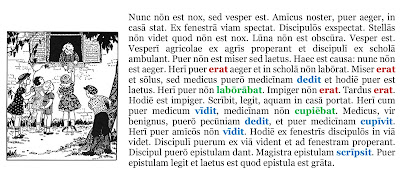Rēgulus et Mānlius, cōnsulēs Rōmānī, postquam
classem Poenōrum vīcērunt, ad Āfricam nāvigāvērunt et oppida multa
expugnāvērunt. Inde Rēgulus, imperātor Rōmānus, cum legiōnibus agrōs
hostium vastābat. Sed posteā Xanthippus, imperātor Graecus, cum
elephantīs multīs bellum contrā Rōmānōs gerēbat. Mīlitēs Rōmānī, quī erant
in castrīs prope lacum, labōre et sitī erant fessī. Subitō Xanthippus
legiōnēs Rōmānās oppugnat: numerum magnum Rōmānōrum capit aut necat: Rēgulus
etiam est inter captīvōs. Inde Poenī Rēgulum Rōmam dē pāce mittunt. Sed Rēgulus
Rōmānōs ad bellum incitat. ‘Ō Rōmānī,' inquit, ‘animum ad bellum firmāte;
hostēs mox superābitis.’ Inde Rēgulus ad Āfricam nāvigāvit et Poenī imperātōrem
Rōmānum crūdēliter necāvērunt.
sitis, -is [3/f]: thirst
Poenus, -ī [2/m]: Carthaginian;
also: Carthāginiēnsis, -e [3]
Notes
[1] Sentence structure
[i] Rēgulus et Mānlius, consūlēs
Rōmānī, ¦ [ii] postquam classem Poenōrum vīcērunt [subordinate clause of
time], [i] ad Āfricam nāvigāvērunt et [iii] oppida multa expugnāvērunt.
[i] Mīlitēs Rōmānī, ¦ [ii] quī
erant in castrīs prope lacum [relative / adjectival clause], ¦ [i] labōre
et sitī erant fessī.
Watch out for three words which
all mean the same in English but have different functions in Latin:
[a] post (preposition +
accusative): after; post bellum │ after the war
[b] posteā (adverb): after(wards)
Sed posteā Xanthippus … bellum
contrā Rōmānōs gerēbat. │But afterwards Xanthippus … began waging war
against the Romans
[c] postquam (conjunction,
introducing a subordinate clause of time): after
… postquam classem
Poenōrum vīcērunt … │ …after they conquered the Carthaginians’ fleet …
[2] case usage: ablative of
cause
Mīlitēs Rōmānī … labōre et
sitī erant fessī. │ The Roman soldiers … were tired from hunger
and (from) thirst.
The ablative expresses the cause
that prompts / results in the action or accounts for the present state.
Exsiluī gaudiō. (Cicero)│
I jumped for joy.
Lacrimō gaudiō. (Terence)
│ I weep for joy.
… atque ibi morbō mortuus
est. (Eutropius) │ …and there he died of / from / as a result of a disease.
It can occur with a preposition:
ex vulnere aeger │
disabled by / from / as a result of a wound
ārdēre dolōre et īrā (Cicero)
│ to be on fire with pain and (with) anger
[3] apposition
Rēgulus et Mānlius, consūlēs
Rōmānī, …
Rēgulus, imperātor Rōmānus, …
Xanthippus, imperātor Graecus, …
Appposition refers to two or more
words which are adjacent to one another and refer to the same person / thing:
I live in Paris.
I live in the capital of France.
I live in [i] Paris, [ii] the
capital of France. In the sentence ‘Paris’ and ‘the capital of France’ are
in apposition.
[i] Henry the Eighth, [ii] the
King of England ¦ at that time, …
[i] My brother [ii] Joe is a
great athlete.
When this occurs, both parts of
the apposition are in the same case:
Xanthippus, imperātor Graecus … │
Xanthippus, the Greek commander …
Xanthippus [nominative],
imperātor Graecus [nominative] …. bellum contrā Rōmānōs gerēbat. │
Xanthippus, the Greek commander … began waging war against the Romans.
Rēgulus et Mānlius [nominative],
consūlēs Rōmānī [nominative], … classem Poenōrum vīcērunt. │ Regulus and
Manlius, the Roman consuls, … conquered the Carthaginians’ fleet.
Regulus and Manlius, the Roman
consuls, after they defeated the Carthaginian fleet, sailed to Africa and
sacked many towns. Then Regulus, the Roman commander, laid waste the fields of
the enemy with his legions. But afterwards Xanthippus, the Greek emperor, waged
war against the Romans with many elephants. The Roman soldiers, who were in a camp
near the lake, were tired with toil and thirst. Suddenly Xanthippus attacks the
Roman legions: he captures or kills a large number of the Romans: Regulus is
also among the captives. Then the Carthaginians sent Rēgulus to Rome for [to
make] peace. But Rēgulus incites the Romans to war. “O Romans,'' he said, “strengthen
your mind mind for war; you will soon overcome your enemies.' Then Regulus
sailed to Africa and the Carthaginians cruelly killed the Roman commander.
____________________
https://www.lookandlearn.com/blog/21734/the-honourable-consul-regulus-returned-to-die-in-carthage/
Marcus Atilius Regulus returning to Carthage. Illustration for Storia d'Italia by Paolo Giudici (Nerbini, 1929).
Polybius: Xanthippus of Sparta















